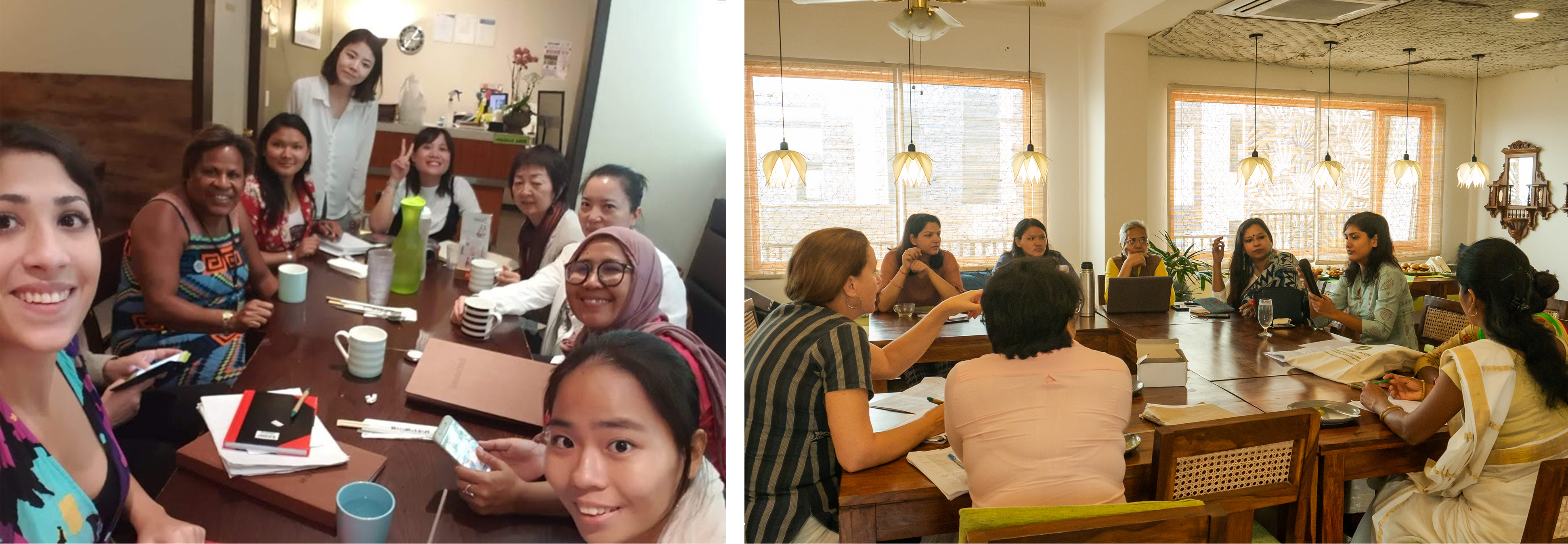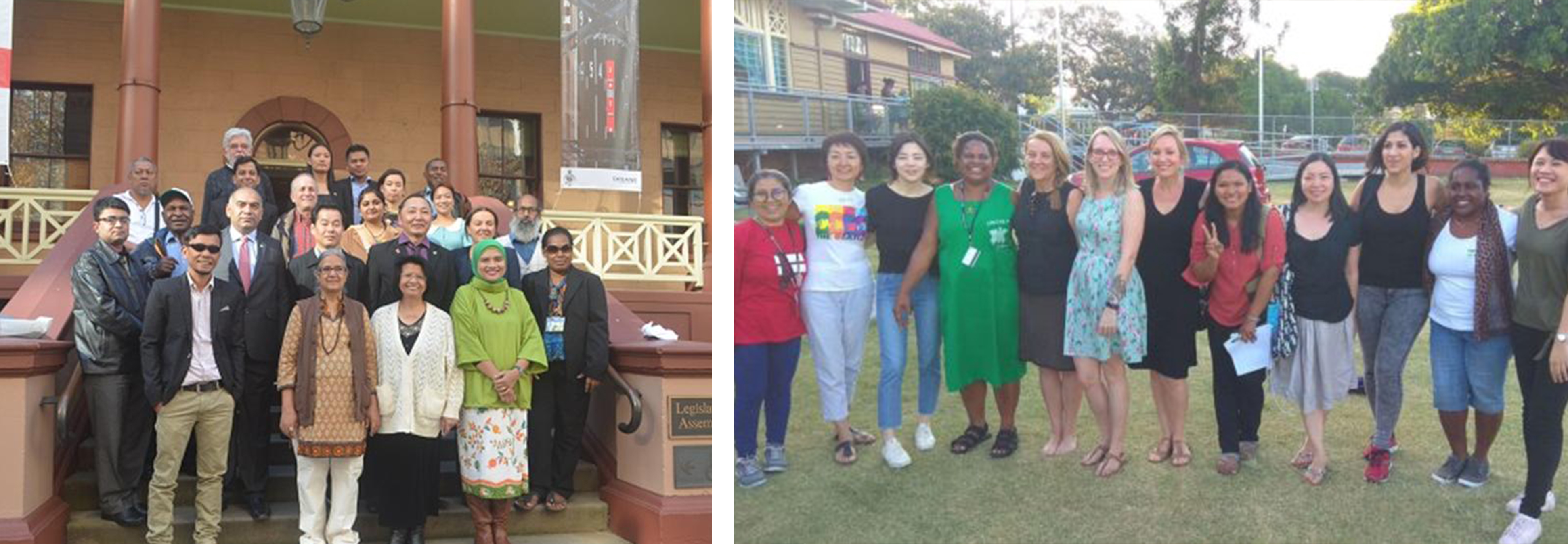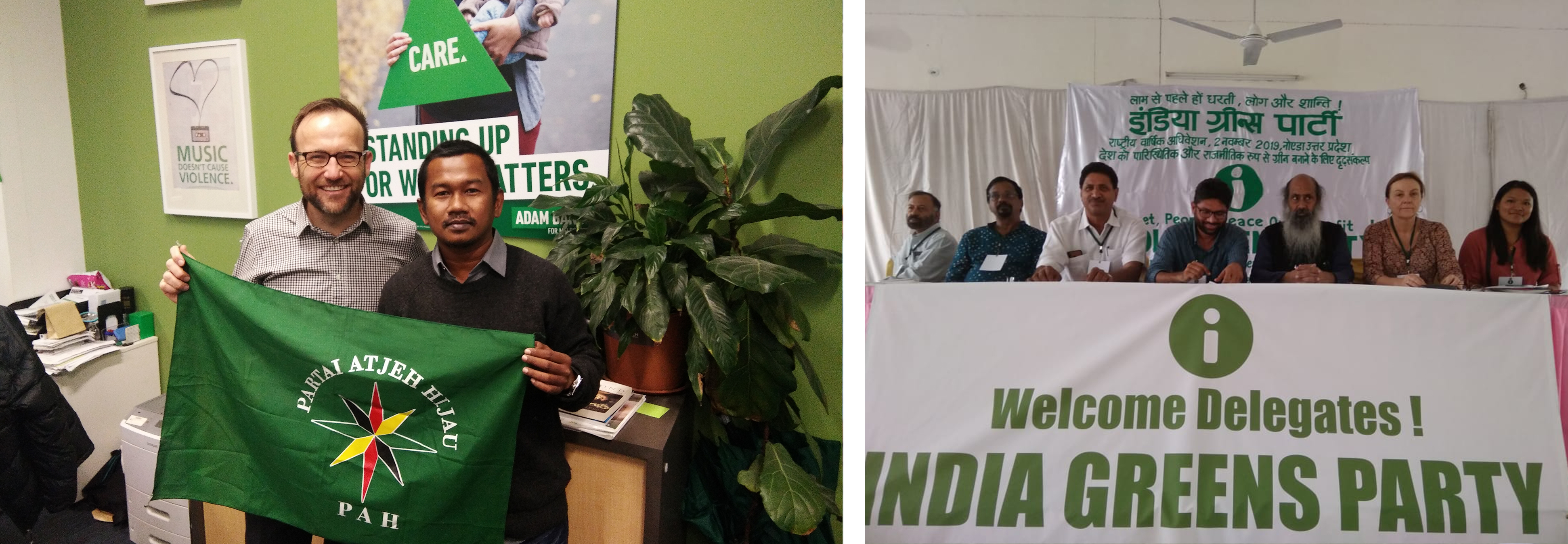This year marks 13 years of the Australian Greens’ International Development Committee (IDC). From providing election assistance to delivering much-needed training, the IDC does an incredible job of helping developing Green parties around the world build capacity. IDC Coordinator Michelle Sheather takes a look back at 13 extraordinary years.
BY MICHELLE SHEATHER
AG International Development Committee Coordinator
he Australian Greens International Development Committee was established 13 years ago to help assist and support the work of Green parties in Asia and the Pacific. In 2016, we extended our activities to the Middle East Greens. Through a grant received from the Federal Department of Finance, we redistribute these funds to new and emerging parties in our region, and to initiate training and in-country specific projects that they request.
Since we began, we have undertaken over 60 projects in-country. We’ve supported countries like PNG, Nepal, Indonesia and Lebanon with initiatives such as communications training; training in the build-up to regional or national elections; green schools and weekend training camps; and gender equity training and mentoring. We also assist with logistics in remote areas for delegates to attend national congresses, party events and trainings, as well as the Global Greens Congresses to be a part of the 105-party-strong Global Greens.
Through the activities of the IDC, parties learn cross-culturally from one another’s experiences. These are highlighted in study tours where delegates from the Asia Pacific Greens Federation (APGF) of parties come to Australia to exchange their experiences and to learn from our own history and experience. The India Greens party was set up after our 2016 study tour and described the learning on that tour as a roadmap for their own party to adapt and develop.

impact we’ve had around the world has been immeasurable. Of our work, Tika Bhandari of the Nepali Greens – and APGF Co-Convenor – says: “The Australian Greens have provided great support to the Nepali Greens through mentoring, trainings in Australia and Nepal and support for our Green schools’ program.
“Additionally, as APGF Co-Convenor, I have seen IDC projects in many Green parties in our region make a real contribution to their growth as well as support for our Federation Secretariat.”
Over the past three years, we have undertaken projects assisting parties in PNG, Lebanon, Pakistan, Atjeh Indonesia, Nepal, India, Mongolia, Solomon Islands, Bangladesh and the Philippines, which included bringing together the Middle East Greens in 2019 for the first time in Lebanon. We hope to be able to do the same for new and established Green parties in the Pacific in the future.
Since 2017, the IDC has also worked alongside the APGF Women’s Network (APGFWN). We’ve delivered a strong program of work in mentoring women into leadership roles within Green parties, and undertaking gender equity trainings both in person and online for the parties. In the Pacific, for instance, only six percent of parliamentarians are women. And after our involvement, for the first time the council representatives from each party to APGF is now 69 percent versus 20 percent six years ago.
Working with APGFWN, we’ve now trained around 30 women across Asia Pacific and the Middle East to themselves become gender equity trainers. The program has grown from a small pilot training in India in 2019 to a huge regional success by the end of 2022.
Currently, 10 women are mentored annually in two intakes. Many of our most experienced AG women are or have been mentors, including Senator Janet Rice and former Canterbury-Bankstown Councilor Linda Eisler. We very much look forward to the fruits these initiatives have planted.


ver the past 13 years, we’ve assisted parties to navigate sometimes very complex registration systems in their own countries; supported them in difficult times in their own country; and supported the development of their own election campaigns – sometimes for the first time – as well as their own national trainings.
Additionally, working in cooperation with the APGF Secretariat we have assisted with policy development on topics ranging from water rights to human rights and education to environmental protection. We have also undertaken regional party fundraising and policy development trainings; as well as undertaken an internship program for key APGF party members in Australia – for instance, to observe and learn from our election campaigns.
A highlight for many is the study tours the IDC organises to Australia, where delegates from all of our regional parties travel to Australia. AG state and federal MPs, staffers and councillors participate.
In 2023, we have plans to make this a hybrid study tour with online webinars and cross-party online workshops, culminating in a face-to-face two-day training near Seoul in Korea immediately prior to the next Global Greens Congress. We will also support delegates from non-OECD parties by covering their expenses to travel, which may otherwise prohibit each party to be represented.
Senator Mehreen Faruqi beautifully summed up the critical nature of the work of the IDC when highlighting that our movement for global justice has never been more important.
“The challenges we face are global; they are not confined within arbitrary geographical boundaries of nations, they stem from colonialism and from the Global North using a massive share of the Earth's resources,” she said.
“The brunt of this resource extraction and overconsumption is borne by those who were least responsible for it in the form of climate change and poverty. For us, Australian Greens, is it crucial to recognise these disparities and work with other representatives in the AGPF on their terms by learning more about their needs and contexts. One way to do this for a wealthy nation like Australia is by reframing the whole idea of international aid, not as charity but as reparations owed to those nations.”
The contribution the Australian Greens make through the work of the IDC is critical to the ongoing development of real Green parties in the region. Many of these parties are on the frontlines of some of our world’s most pressing crises – to play our part in helping to provide a genuine option for voters on these issues we value and encompass is priceless.